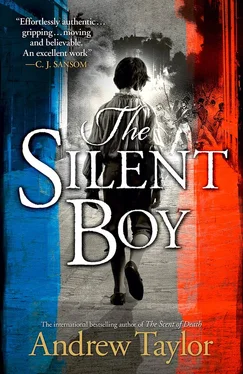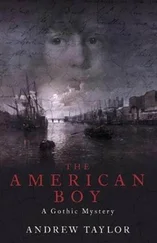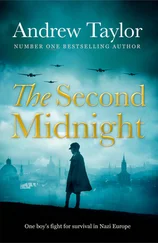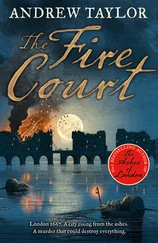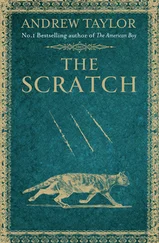If this is a cottage, Savill thought, then I am a unicorn. The house had been refurbished since he had last been here. It now sat in grounds that were in the process of being newly laid out; on the east side of the drive, a great expanse of grass swept towards a small lake that had not been there before. As for the house, the new wing would increase its volume almost by half as much again. The work was nearly finished. Earlier in the day, carpenters had been fitting the French windows that would open from the library to the terrace.
‘Will you retire here, sir?’
‘Retire?’ Rampton smiled. ‘I doubt my masters would permit me to do that, not while this crisis continues in France. And God knows how long that will last. I tell you frankly, sir, I see no sign of its ending.’
‘You do not think that the King and the National Convention will come to an accommodation?’
Rampton’s smile did not waver. ‘That is for wiser heads than yours or mine to decide.’ He turned the subject smoothly. ‘But when I do retire, it will be delightful to be here.’
‘Will you not find it sadly dull?’
‘Not in the slightest. I shall have my books, of course, and I have a mind to turn farmer.’ Rampton crooked his finger at the servant who sprang from the shadows to refill Savill’s glass. ‘I have bought two or three tenanted farms nearby. I may take them into my own hands. A toast, sir – to your Elizabeth. May she find herself a husband that suits you both.’
Savill drank. He had once been a civil servant, and in those days he had known Mr Rampton’s ways as a dog knows his master’s. Rampton had not been talking idly during the meal. He had been making sure that Savill understood him.
‘I am rich,’ he was saying, ‘and I have the ear of powerful men, so you would be wise to oblige me. For your daughter’s sake as well as your own.’
With unnatural reverence, the servants removed the cloth and set out the wine, the nuts and the fruit. Rampton signalled for them to withdraw. The two men were sitting side by side now.
Savill bit down on a walnut and a stab of pain drove into his jaw. He twitched on his chair but managed to avoid crying out. He must find time to have the offending tooth pulled out. The truth was, he told himself, he was a coward where his teeth were concerned.
‘A toast, sir,’ Rampton said.
Savill pushed aside his plate and took up his glass with relief. They drank His Majesty’s health. Avoiding each other’s eyes, they drank to Augusta’s memory. Then the conversation faltered.
‘His name is Charles,’ Rampton snapped, as if Savill had said it was something quite different. ‘He must be about ten or eleven years old. Thereabouts.’
‘Do you know who his father is?’
Rampton cracked his knuckles, in the old days a sign of calculation; his clerks had mocked him for it, but only when they were safely out of his way. ‘I have not been able to ascertain that. I believe Augusta had left the Bavarian gentleman by then and was living in Rome, but my information is not exact.’
‘Does Charles speak English?’ Savill said.
‘The question had not occurred to me. I suppose, if he was born in Italy and he has spent the last few years in France …’ Rampton turned away and stared up at a portrait of himself. ‘Still,’ he went on in a quieter voice, ‘at his age it hardly signifies. The mind of a child is as porous as a sponge. It soaks up whatever you pour into it with extraordinary rapidity.’
‘If his father cannot be found, no doubt his mother’s friends will care for him. Where is he staying?’
‘The Embassy will let me know as soon as they hear.’
‘He’s nothing to do with me,’ Savill said, more loudly than he had intended. ‘He’s Augusta’s bastard.’
‘Pray moderate your voice, sir. You do not want the world to know your business.’
‘But it is not my business, sir. That’s my point.’
Rampton refilled their glasses. ‘The law would say otherwise. Augusta was still your wife at the time of her death. You and she were not divorced. I understand that she did not even leave a will, which makes you her heir. The child’s paternity is not established, and probably never will be. In sum, this is one of those cases where the law and common sense point in the same direction as a man’s duty as a Christian. The boy is your responsibility.’
‘Nonsense.’
To Savill’s surprise, Rampton smiled. ‘I thought you would say that. And, that being the case, my dear sir, let me propose a solution.’
‘You may propose what you wish, sir. It is nothing to do with me.’
Rampton leaned closer. ‘What if I take the boy myself?’
Charles dreams of the boy called Louis.
He, Charles, is lying on his bed and Louis is standing by the window. This is similar to what actually happened when Dr Gohlis came at dawn that morning. But, in the dream, Charles already knows Louis’s name. He also knows that Louis is alone and naked in the world.
In the dream the light is much stronger than it was in real life. It floods over the doubly naked body of Louis. The colours glow like the stained glass in Notre Dame. Who would have thought there would be so many colours under a boy’s skin?
Charles glances down at his own body. He discovers that, though it is daytime, he is not wearing any clothes. Nor is he lying under the bedclothes. Like Louis, he has lost most of his skin. He sees rope-like arteries, the blue filigree of veins, the slabs of muscle, the shiny white knobs of bone. He too has become doubly naked.
He too has become beautiful.
Louis stares out of the window. But now he turns, his head leading his body. Charles sees his ruined face. Louis smiles, though of course it is not easy to tell that he is smiling because his lips and skin are gone and so has most of his facial tissue.
Louis holds out his right hand towards Charles. The gesture is unmistakably friendly. Charles tries to smile in return. That is, he thinks a smile, but he knows that he too lacks lips and skin so the smile may not be obvious.
He raises his right hand. It looks webbed, like a duck’s foot or the ribbed leaf of a cabbage.
‘Hello, Louis,’ he says.
Day by day, the house in the Rue du Bac empties itself of people and things. It also empties itself of its invisible contents, its rules, its habits, its regime. Charles does almost as he pleases now. He is under no restraint as long as he does not try to leave.
The servants are slipping away, despite the guards at the gates and doors leading to the outer world. They leave their tasks half-done – a mop standing in a pail of dirty water in a corner of the grand staircase; a drawing room with only a third of the furniture covered up and the pictures and ornaments ranged along one wall on the floor with the packing materials beside them.
The house is sliding into an unknown, unpredictable future, just as Charles is. He wanders from room to room, from salon to hall, from attic to cellar, frequently losing his way. The old woman who was meant to be looking after him is hardly ever there. He realizes after a while that he has not seen her for days. Perhaps she is dead.
Time itself loses its familiar markers, the hours of the day, the days of the week. There are many clocks in this house but no one troubles to wind them now or to set their hands. So time disintegrates into a variety of smaller times: and soon there will be no time at all.
Now that the old woman no longer brings him food, he is obliged to forage for it himself. He finds his way to the vaulted kitchens whose cellars run under the street.
In the city outside, people are starving. Here there is more food than anyone could ever eat. There are vegetables rotting down to brown mush; joints of meat turning grey and breeding maggots; and bins of flour that feed a shifting population of insects and small animals.
Читать дальше
